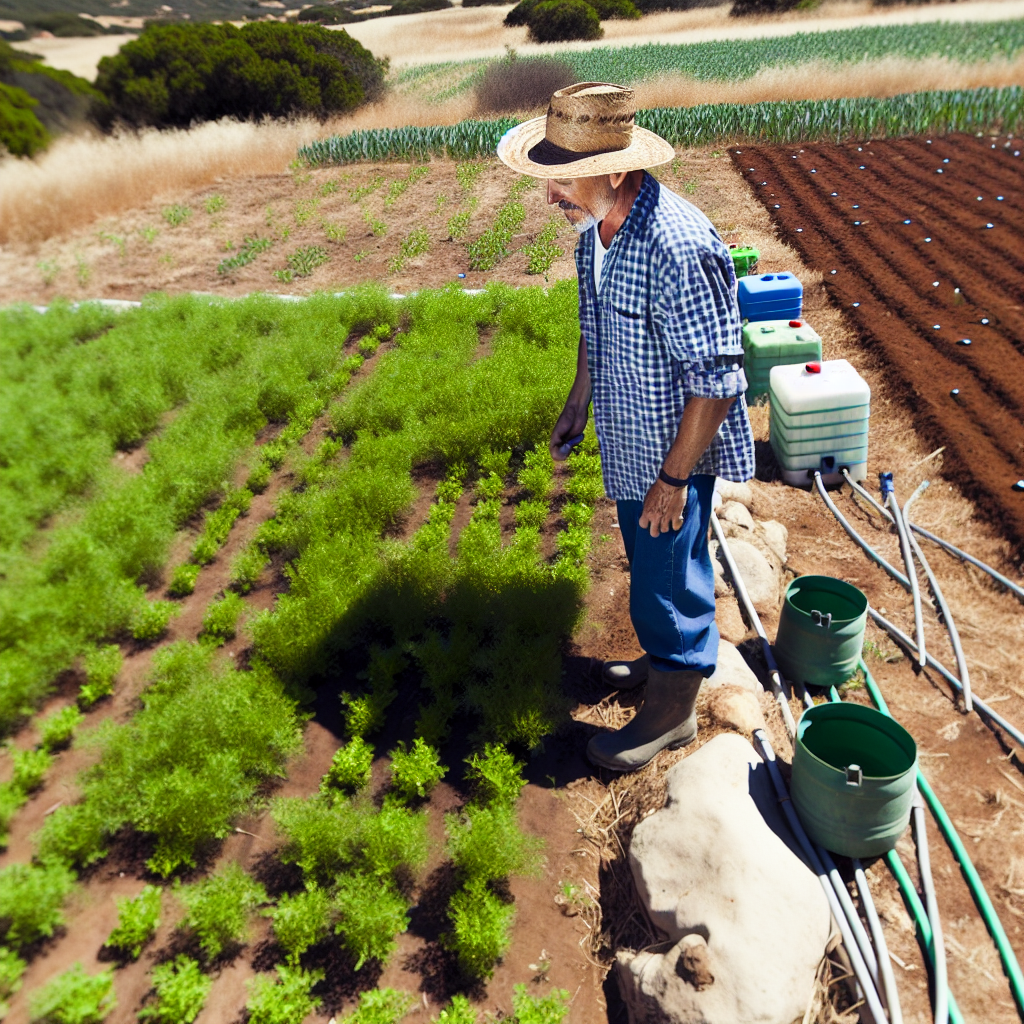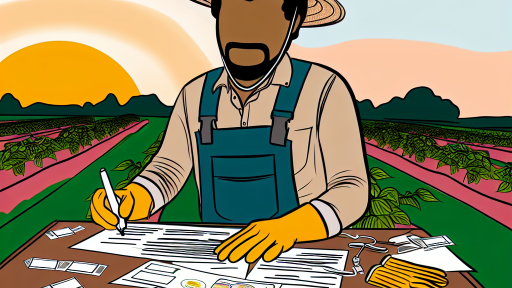Introduction to Sustainable Farming
Importance of Sustainable Farming
Sustainable farming plays a crucial role in addressing global food security.
This approach fosters better environmental practices.
Ultimately, it promotes healthy ecosystems and communities.
Farmers who adopt sustainable practices contribute to reducing carbon footprints.
Moreover, sustainability helps preserve natural resources for future generations.
Practices in Sustainable Farming
Sustainable farming includes various techniques that enhance productivity.
Organic farming practices improve soil health by avoiding synthetic chemicals.
Crop rotation helps prevent pest infestations and soil depletion.
Integrating livestock can enhance nutrient cycling in farming systems.
Cover cropping protects soil and improves water retention.
Adapting to Water Restrictions
Many regions face increasing pressure from water scarcity.
Farmers must adapt sustainable practices to comply with water restrictions.
Implementing efficient irrigation systems conserves valuable water resources.
Rainwater harvesting offers a significant alternative source of water.
Additionally, selecting drought-resistant crop varieties ensures resilience.
Transform Your Agribusiness
Unlock your farm's potential with expert advice tailored to your needs. Get actionable steps that drive real results.
Get StartedFarmers can also utilize soil moisture monitoring technology.
Understanding Water Restrictions
Types of Water Restrictions
Water restrictions vary significantly across regions.
One common type is outright bans on outdoor watering.
Additionally, there may be limits on specific days for irrigation.
Another type involves restrictions on water usage in certain sectors.
Finally, some areas impose tiered pricing structures to curb consumption.
Reasons for Water Restrictions
Water restrictions often arise from prolonged droughts.
Climate change contributes to diminishing water supplies.
Increased demand from growing populations also plays a role.
Furthermore, agricultural practices may deplete local water resources.
Lastly, maintaining ecosystem health is crucial, necessitating restrictions.
Impacts of Water Restrictions on Agriculture
Farmers face significant challenges under water restrictions.
Crop yields may decline due to inadequate irrigation.
Additionally, competition for water resources intensifies.
Certain farming practices may need reevaluation and adaptation.
Some farmers adopt new technologies to mitigate impacts.
Impact of Water Scarcity on Agriculture
Challenges Faced
Water scarcity significantly impacts agricultural productivity.
Farmers struggle to maintain crop yields under water restrictions.
Growing crops requires precise water management techniques.
Many regions face intense drought conditions each year.
This leads to increased competition for limited water resources.
Effects on Crop Selection
Water scarcity forces farmers to reconsider crop choices.
Drought-resistant varieties become more appealing options.
Traditional crops may no longer thrive in these conditions.
Showcase Your Farming Business
Publish your professional farming services profile on our blog for a one-time fee of $200 and reach a dedicated audience of farmers and agribusiness owners.
Publish Your ProfileFarmers often experiment with alternative crops to adapt.
This shift in crop selection can affect local economies.
Soil Degradation Risks
Prolonged water restrictions can lead to soil degradation.
Without adequate moisture, soil health deteriorates over time.
This results in reduced yields and increased erosion risks.
Farmers must implement soil conservation practices proactively.
Economic Consequences
Water scarcity has severe economic implications for farmers.
Lower yields translate to reduced income and profit margins.
Many farmers face financial instability and debt challenges.
Adapting to water scarcity incurs additional costs.
Investment in efficient irrigation systems becomes necessary.
Community Impact
Water scarcity affects entire agricultural communities.
Families relying on farming for their livelihood face hardships.
Food security becomes a pressing issue in affected regions.
Community support systems may weaken under stress.
Collaborative water management strategies can aid resilience.
You Might Also Like: Challenges and Solutions in Food Safety Compliance for Farmers
Innovative Irrigation Techniques
Drip Irrigation
Drip irrigation delivers water directly to plant roots.
This method minimizes water loss through evaporation.
Moreover, it reduces weed growth by limiting water availability to non-target plants.
Farmers can save up to 50% more water compared to traditional methods.
Technologies have advanced, making systems more affordable and efficient.
For example, modern sensors help optimize water use based on soil moisture.
Farmers like Elena Ruiz from Green Fields report increased crop yields using this method.
Subsurface Irrigation
Subsurface irrigation involves placing pipes beneath the soil surface.
It effectively uses gravitational flow to deliver water directly to plants.
This method minimizes evaporation, significantly increasing efficiency.
Additionally, it reduces runoff and waterlogging in fields.
Farmers can implement this system in various soil types.
Specific crops thrive with subsurface irrigation, including potatoes and carrots.
Benefits include improved water quality and reduced soil salinity.
Innovative companies like AquaCrop are leading in this technology.
Benefits of Innovative Techniques
Adopting innovative irrigation techniques brings multiple benefits.
Firstly, these methods conserve water during droughts.
Secondly, they enhance soil health by preventing erosion.
Furthermore, they improve labor efficiency since less manual watering is needed.
Lastly, farmers find that healthier crops lead to better market prices.
Challenges and Solutions
Though beneficial, these irrigation methods can present challenges.
Initial setup costs can be high, deterring some farmers.
However, government grants and incentives can ease these expenses.
Showcase Your Farming Business
Publish your professional farming services profile on our blog for a one-time fee of $200 and reach a dedicated audience of farmers and agribusiness owners.
Publish Your ProfileAdditionally, technical knowledge is essential for optimal system performance.
Training and workshops by agricultural organizations help farmers adopt these practices.
By addressing these challenges, more farmers can utilize innovative irrigation techniques.
You Might Also Like: Understanding Organic Farming Standards
Soil Health Management: Enhancing Water Retention and Quality
Importance of Soil Health
Soil health is vital for sustainable farming.
Healthy soil improves water retention.
Moreover, it enhances crop yields.
Techniques for Improving Soil Quality
Implement cover cropping to protect soil.
Cover crops prevent erosion and enhance organic matter.
Additionally, they improve soil structure.
Utilize crop rotation for better soil health.
Crop rotation disrupts pest cycles effectively.
It also enhances nutrient availability over time.
Adopt no-till farming practices.
No-till allows for better water infiltration.
It minimizes soil disturbance, preserving its structure.
Water Retention Strategies
Build swales and contour plots to capture water.
These structures encourage water movement and retention.
Furthermore, they reduce runoff and erosion.
Incorporate organic amendments, like compost.
Organic matter increases the soil’s water-holding capacity.
This addition promotes a healthier microbe ecosystem.
Quality Enhancement Practices
Regular soil testing informs nutrient management decisions.
Understanding nutrient levels helps tailor amendments.
Moreover, it prevents over-fertilization and runoff.
Minimize chemical usage to protect soil organisms.
Choosing natural pesticides and fertilizers supports biodiversity.
This action ultimately enhances soil quality and health.
Continuous Improvement and Monitoring
Regularly assess soil moisture levels.
Monitoring can guide irrigation and water management strategies.
Adjust practices based on observed soil health indicators.
Engage with local agricultural extension services.
They offer resources and expertise for better soil management.
Such partnerships can enhance farm sustainability.
Gain More Insights: Compliance Tips for Farm Labor Laws
Crop Selection and Diversification: Drought-Resistant Varieties
Understanding Drought-Resistant Varieties
Drought-resistant varieties are essential for sustainable farming.
They require less water, making them ideal under water restrictions.
Farmers can benefit from these crops in multiple ways.
These varieties adapt better to dry conditions.
Additionally, they typically have deep root systems.
Showcase Your Farming Business
Publish your professional farming services profile on our blog for a one-time fee of $200 and reach a dedicated audience of farmers and agribusiness owners.
Publish Your ProfileThis allows them to access moisture more effectively.
Key Drought-Resistant Crops
Several crops stand out as reliable drought-resistant options.
- Millet is a strong candidate for arid environments.
- Sorghum thrives in heat and drought conditions.
- Teff is also gaining popularity for its resilience.
- Certain legumes can withstand lesser water availability.
These crops can be integrated into diverse farming systems.
The Importance of Crop Diversification
Diversity in crops helps mitigate risks associated with drought.
It enhances soil health and prevents pest outbreaks.
Additionally, diverse crops can improve overall farm productivity.
This approach allows farmers to adapt to changing conditions.
Implementing a Strategy for Crop Selection
Farmers should consider local climate and soil conditions.
Conducting soil tests can provide essential insights.
Additionally, collaborating with agricultural experts can guide decisions.
These steps enhance the efficiency of crop selection.
Ultimately, the aim is to build resilient farming systems.
Long-term Benefits of Choosing Drought-Resistant Varieties
Drought-resistant crops contribute to food security.
They reduce reliance on irrigation, thus conserving water resources.
Furthermore, these crops often require fewer chemical inputs.
Hence, they promote healthier ecosystems.
Investing in these varieties is a proactive approach.
Find Out More: The Role of Trade Agreements in Farming Success

The Role of Technology in Water Management
Overview of Technological Advances
Modern farming utilizes advanced technology for efficient water management.
Innovations such as sensors and data analytics play a crucial role.
They help farmers optimize their water usage while ensuring crop health.
Sensors for Real-Time Monitoring
Sensors offer real-time data on soil moisture levels.
This information helps farmers make timely irrigation decisions.
With accurate data, they can determine when crops need water.
Additionally, sensors can detect weather conditions impacting water use.
Data Analytics for Resource Optimization
Data analytics transforms raw data into actionable insights.
Farmers use software to analyze historical water usage patterns.
These insights enable them to forecast future water needs.
Consequently, they can plan more effectively for irrigation schedules.
Integration of Technology Solutions
Farmers are integrating various technologies to enhance efficiency.
This includes combining sensors with automated irrigation systems.
Such integration ensures precise water application based on real-time data.
As a result, resource waste significantly decreases.
Case Studies of Successful Implementation
Many farms have successfully implemented these technologies.
For instance, Green Valley Farms uses moisture sensors extensively.
They reported a 30% reduction in water usage after implementation.
Similarly, Rivers Edge Orchard applied data analytics for irrigation scheduling.
This approach led to healthier crops with lower water consumption.
Community and Policy Engagement: Advocating for Sustainable Water Use
Engaging the Local Community
Community engagement is vital for sustainable water use in agriculture.
Farmers, businesses, and residents need to collaborate.
Showcase Your Farming Business
Publish your professional farming services profile on our blog for a one-time fee of $200 and reach a dedicated audience of farmers and agribusiness owners.
Publish Your ProfileHosting workshops can educate the community about water conservation.
For example, local farms can showcase efficient irrigation techniques.
Additionally, community gardens can promote water-saving practices.
These initiatives encourage shared responsibility and participation.
Building Partnerships with Local Organizations
Collaboration with local organizations enhances advocacy efforts.
Nonprofits focused on environmental issues can provide resources.
They can assist in organizing community events aimed at water conservation.
Furthermore, universities can contribute research and expertise.
Joint projects can lead to innovative solutions for local water challenges.
Policy Advocacy for Sustainable Practices
Local policies significantly impact water management in agriculture.
Farmers should actively engage with policymakers.
Establishing local councils can facilitate discussions on best practices.
These councils can advocate for policies supporting sustainable agriculture.
Moreover, they can address the challenges posed by water restrictions.
Educational Campaigns for Awareness
Effective communication raises awareness about sustainable water use.
Social media platforms can spread information quickly and broadly.
Creating informative content can boost public understanding.
Community newsletters are another way to share successful strategies.
Additionally, local radio programs can feature expert discussions.
Implementing Incentive Programs
Incentive programs motivate farmers to adopt sustainable practices.
Financial support for water-efficient technologies can be effective.
For instance, grants can help with upgrading irrigation systems.
Furthermore, recognition programs can celebrate sustainable efforts.
Such initiatives strengthen community commitment to water conservation.
Case Studies: Successful Sustainable Farming Practices Under Water Restrictions
Innovative Micro-Irrigation Techniques
Farmers in California utilize micro-irrigation systems.
This method delivers water directly to plant roots.
Consequently, it reduces water wastage significantly.
For instance, Roger’s Orchard adopted drip irrigation.
They saw a 30% reduction in water use while maintaining crop yield.
Additionally, precision watering minimizes weed growth.
This leads to less competition for water and nutrients.
Rainwater Harvesting Initiatives
A farm in Texas implemented a rainwater harvesting system.
This system captures and stores roof runoff for irrigation.
As a result, the farm increased its water supply during dry spells.
They experienced substantial savings on water costs.
Furthermore, this practice enhances local water tables.
It provides additional ecological benefits to surrounding areas.
Crop Selection and Diversity
Farmers can combat water shortages through crop diversity.
For example, the Miller Farm transitioned to drought-resistant crops.
This strategy allowed the farm to thrive under water restrictions.
Showcase Your Farming Business
Publish your professional farming services profile on our blog for a one-time fee of $200 and reach a dedicated audience of farmers and agribusiness owners.
Publish Your ProfileTheir yields remained stable despite challenging conditions.
Moreover, by rotating crops, farmers improve soil health.
Healthy soil retains moisture more effectively than depleted soil.
Community-Based Water Management
A successful initiative in Oregon involved community collaboration.
Local farmers formed a water management cooperative.
This group shares resources and knowledge about conservation practices.
Consequently, they effectively reduced overall water usage.
In addition, this collaboration fosters a sense of community.
Farmers support each other in implementing sustainable strategies.
Adoption of Agroecological Practices
Agroecological methods emphasize local resources and biodiversity.
For example, the Green Pastures farm integrated soil and water conservation methods.
This approach drastically reduced their dependence on irrigation.
They rely more on natural rainfall and less on artificial sources.
Furthermore, agroecological practices enhance ecological resilience.
Such systems withstand extreme weather fluctuations.
Future Trends: Research and Innovations for Water-Conservative Agriculture
Emerging Technologies
Innovative technologies are reshaping sustainable farming practices.
Precision agriculture utilizes data analytics to optimize water usage.
Farmers can now monitor soil moisture levels in real-time.
This approach significantly reduces unnecessary irrigation.
Additionally, drip irrigation systems deliver water directly to plant roots.
These systems minimize evaporation and runoff.
Biotechnology Advancements
Biotechnology plays a crucial role in developing drought-resistant crops.
Scientists are exploring genetic modifications to enhance water retention.
These crops require less water while maintaining high yields.
Moreover, research focuses on improving soil microbiomes for better nutrient uptake.
This research will further support sustainable farming practices.
Water Recycling Methods
Water recycling technology offers significant benefits to agriculture.
Farmers can reuse water for irrigation through innovative filtration systems.
These systems clean and purify water to ensure safety for crops.
This practice contributes to more efficient water management.
Consequently, it helps reduce the burden on local water supplies.
Collaboration and Research Initiatives
Collaboration among researchers, farmers, and policymakers drives progress.
Institutions like the Center for Sustainable Agriculture foster innovation.
Joint efforts focus on developing new farming techniques.
These initiatives encourage data sharing and best practices among farmers.
Through partnerships, communities enhance their resilience to water scarcity.
Education and Training Programs
Education is vital in promoting water-conservative practices.
Training programs provide farmers with the necessary tools and skills.
Workshops and seminars help adopt cutting-edge agricultural techniques.
Furthermore, outreach efforts raise awareness about water conservation.
Showcase Your Farming Business
Publish your professional farming services profile on our blog for a one-time fee of $200 and reach a dedicated audience of farmers and agribusiness owners.
Publish Your ProfileInformed farmers make better decisions for sustainable land management.
Additional Resources
What is the Farm Bill? – National Sustainable Agriculture Coalition




